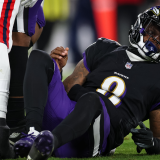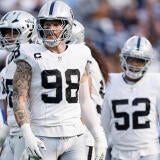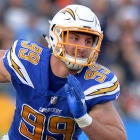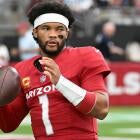Agent's Take: A fifth-year option guide for every team's first-round pick from 2016
Joey Bosa could reset the pass rusher market, but it's hard to imagine the Raiders picking up Karl Joseph's option
Decisions on fifth-year options fly somewhat under the radar because of the timing. The window to pick up options begins after a player's third NFL regular season ends (Dec. 31, 2018, with the 2016 first-round picks). The options must be picked up before May 3 (Friday). Since NFL teams typically don't make a decision until the deadline is approaching, most of the attention is on the NFL Draft, which took place April 25-27 this year.
The fifth year is guaranteed for injury when the option is exercised. The option year becomes fully guaranteed on the first day of the league year in the fifth contract year (early to mid-March 2020 for the 2016 draft class).
Teams that pick up the option year rarely release a player before the full guarantee takes effect. Most notably, the Redskins released quarterback Robert Griffin III in early March 2016 before his $16.155 million option year became fully guaranteed. The Texans cut cornerback Kevin Johnson in early March to avoid his $9.069 million fifth-year salary from becoming fully guaranteed.
Contracts for draft choices can't be renegotiated until the conclusion of a player's third regular season. This means players selected in the 2016 draft are eligible to sign new deals. Most first-round picks don't get contracts extended before their fourth season. Rams running back Todd Gurley was the only 2015 first-round pick to sign a new deal after his third season. None of the 2014 first-round picks received contract extensions before the beginning of their fourth NFL season. By contrast, five 2013 first-round picks received new deals prior to playing their fourth year.
There's a difference in option-year salary depending where in the first round a player is drafted. The fifth-year salary for the top 10 picks is the transition tender (average of the 10 highest salaries) at a player's position when the option is exercised. With players selected outside of the top 10 (picks 11-32), the fifth-year salary is the average of the third through 25th highest salaries at a player's position.
2016 first-round draft class
The chart below contains the fifth-year option year salaries for 2016 first round picks.
| Position | First 10 picks | Picks 11-32 |
|---|---|---|
Cornerback | $13,703,00 | $9,954,000 |
Defensive end | $14,360,000 | $9,451,000 |
Defensive tackle | $12,378,000 | $7,690,000 |
Linebacker | $13,222,000 | $9,501,000 |
Offensive line | $12,866,000 | $10,350,000 |
Punter/kicker | $4,537,000 | $3,461,000 |
Quarterback | $22,783,000 | $15,693,000 |
Running back | $9,099,000 | $5,334,000 |
Safety | $9,531,000 | $6,466,000 |
Tight end | $8,815,000 | $5,741,000 |
Wide receiver | $14,794,000 | $10,162,000 |
When the 2018 regular season ended, 29 of the 31 first-round picks were eligible for the fifth-year option. Here's the option year prognosis for each 2016 first-round pick.
First pick: Jared Goff, QB, Rams
Goff is the Rams quarterback for the foreseeable future despite a terrible performance in Super Bowl LIII. The Rams have been the NFL's most proactive team in signing first-round picks to extensions either before the start of or during the early part of their fourth season (wide receiver Tavon Austin, defensive end Robert Quinn and running back Todd Gurley). Rams president Kevin Demoff recently acknowledged that negotiations for a new Goff deal haven't started and neither side has much urgency. The $34-million-per-year extension Steelers quarterback Ben Roethlisberger signed a day before the NFL Draft likely complicates matters. Goff's representatives will certainly view the deal as particularly relevant because they negotiated it.
Second pick: Carson Wentz, QB, Eagles
A segment of the Eagles fan base would have preferred for Nick Foles to remain in Philadelphia as quarterback with Wentz being traded for a package of draft picks rather than letting the Super Bowl LII MVP walk in free agency. Eagles executive vice-president of football operations Howie Roseman confirmed at the NFL owners meeting in late March he would like a Wentz extension sooner rather than later. Wentz has the same representation as Goff and Roethlisberger, which means Roseman can't reasonably expect any durability concerns about his quarterback leading to some sort of discount with a long-term deal.
Third pick: Joey Bosa, DE, Chargers
Bosa could be a candidate to reset the pass rusher market -- which Bears outside linebacker Khalil Mack currently tops at $23.5 million per year -- in 2020 if he rebounds from an injury plagued 2018 season, where a bone bruise in his left foot sidelined him for the first nine games. The 2016 NFL Defensive Rookie of the Year holds the NFL record for the most sacks in the first 20 games of a career with 19. The injury may have averted a contract standoff this offseason. As the third-overall pick in the 2016 draft, Bosa had the longest contract dispute for an incoming NFL player since the rookie wage scale was implemented by 2011 Collective Bargaining Agreement. Before he signed his rookie contract, 31 days of training camp were missed. Bosa has the same representation as Rams All-Pro interior defensive lineman Aaron Donald: CAA Sports' Todd France. Donald engaged in two lengthy holdouts in 2017 and 2018 before signing his blockbuster deal, which made him the NFL's first $20-million-per-year non-quarterback.
Fourth pick: Ezekiel Elliott, RB, Cowboys
Cowboys chief operating officer and executive vice president Stephen Jones has acknowledged that long-range budgeting contemplates a new Elliott contract. Elliott won his second rushing during his three NFL seasons in 2018. The four-year, $57.5 million extension (worth a maximum of $60 million through salary escalators) the Rams gave Todd Gurley last July will likely be the most important data point, since it's the current salary benchmark for running backs. Gurley might be most analogous anyway, since he is a first-round pick, like Elliott, who got a new deal after his third NFL season. The Cowboys also have a history of early extensions for first-round picks, with center Travis Frederick and offensive tackle Tyron Smith receiving new deals before their fourth seasons started. Wide Amari Cooper and quarterback Dak Prescott are obviously bigger signing priorities since both are in contract years.
Fifth pick: Jalen Ramsey, CB, Jaguars
The Jaguars announced an intention to pick up Ramsey's option year around the start of the NFL combine in late February. Ramsey, who has established himself as arguably the game's best young cornerback, made his desire for a new deal known before the 2018 season had ended. He hasn't endeared himself to Jaguars executive vice president Tom Coughlin by missing the beginning of the offseason workout program. Ramsey is a prime candidate to reset a cornerback market that has been stagnant for quite some time, like inside linebacker was before C.J. Mosley's five-year, $85 million contract with the Jets containing $51 million in guarantees, of which $43 million was fully guaranteed at signing.
Sixth pick: Ronnie Stanley, OT, Ravens
Stanley is now under contract for the next two seasons. The Ravens probably can't afford to let an ascending young offensive lineman at the premium position, left tackle, eventually walk out of the door after losing center Ryan Jensen, offensive guard Kelechi Osemele and right tackle Ricky Wagner to free agency in recent years.
Seventh pick: DeForest Buckner, DT, 49ers
There have reportedly been preliminary discussions about a Buckner extension. Buckner's 12 sacks last season were tied for 14th in the NFL. The 49ers will probably want to keep a new Buckner deal in line with the five-year, $85 million contract edge rusher Dee Ford, who had been franchised, received in connection with his trade from the Chiefs in March for a 2020 second-round pick.
Eighth pick: Jack Conklin, OT, Titans
It wouldn't be surprising if the Titans err of the side of caution by picking up Conklin's fifth year, although injuries have derailed a career that got off to a promising start. Conklin was named first team All-Pro at right tackle as a rookie in 2016. He had a challenging season, returning from the right ACL tear he suffered during a January 2018 AFC playoff game. Swing tackle Dennis Kelly was the better performer for the Titans at right tackle last season.
Ninth pick: Leonard Floyd, OLB, Bears
The Bears didn't waste any time with Floyd's option. General manager Ryan Pace made the decision to exercise the option shortly after the Eagles eliminated the Bears in the wild card playoff round.
10th pick: Eli Apple, CB, Saints
The Saints gave the Giants a 2019 fourth-round pick and a 2020 seventh-round pick to get Apple as last October's trading deadline was approaching. Apple was an upgrade over Ken Crawley, but $13.703 million was too steep of a price to pay for Apple in 2020.
11th pick: Vernon Hargreaves, CB, Buccaneers
Injuries limiting Hargreaves to 10 games over the last two seasons didn't dissuade the Buccaneers from picking up the fifth-year option. New head coach Bruce Arians is intrigued by Hargreaves' potential to thrive in press coverage.
12th pick: Sheldon Rankins, DT, Saints
The Saints exercised Rankins' option, although he tore his Achilles tendon in the NFC divisional playoffs against the Eagles. Rankins had a breakout 2018 season with eight sacks, which were second most on the Saints. He isn't expected to be fully recovered by the start of the regular season.
13th pick: Laremy Tunsil, OT, Dolphins
There was no chance that the Dolphins weren't going to pick up Tunsil's option, with the way competent left tackles who aren't considered elite have gotten paid in free agency the last couple of years (i.e.; Trent Brown and Nate Solder).
14th pick: Karl Joseph, S, Raiders
It's hard to imagine Joseph's option being picked up after the Raiders drafted strong safety Johnathan Abram with the 27th overall pick. Joseph getting off on the wrong foot with head coach Jon Gruden landed him the doghouse early last season. He rebounded to start the season's final eight games.
15th pick: Corey Coleman, WR, Giants
The Browns shipped Coleman to the Bills last preseason for a 2020 seventh-round pick. Coleman didn't survive Buffalo's roster cutdown to 53 players. He showed enough after getting elevated from the Giants' practice squad last season to be given a $2.025 million restricted free agent tender in March.
16th pick: Taylor Decker, OT, Lions
The Lions have bought themselves more time to ultimately make a decision on Decker's future in Detroit by picking up his fifth-year option. His best season came as a rookie in 2016.
17th pick: Keanu Neal, S, Falcons
There was never a question about Neal's fifth-year option. Neal, who tore his left ACL in Atlanta's 2018 season opener, was a participant in the 2017 season's Pro Bowl.
18th pick: Ryan Kelly, C, Colts
The Colts picked up Kelly's option, as expected. Creating a strong offensive line to protect Pro Bowl quarterback Andrew Luck has been a top priority for general manager Chris Ballard.
19th pick: Shaq Lawson, DE, Bills
Lawson is holdover from Doug Whaley's tenure as general manager, which worked against him. Practically everyone who was a Whaley acquisition is no longer in Buffalo. Lawson probably won't be either after the 2019 season, since Buffalo declined his option year.
20th pick: Darron Lee, ILB, Jets
The Jets signing inside linebackers Avery Williamson and C.J. Mosley in free agency the last two years doesn't bode well for Lee's future in New York beyond 2019. The signings should be a clear signal that Lee's option won't get picked up.
21st pick: Will Fuller, WR, Texans
Fuller was a good complement to DeAndre Hopkins before a midseason ACL tear. The Texans picking up Fuller's option doesn't ensure his return in 2020. He could suffer the same fate as cornerback Kevin Johnson in being let go before the fifth year is fully guaranteed without a bounce back from his knee injury.
22nd pick: Josh Doctson, WR, Redskins
The Redskins drafting wide receivers Terry McLaurin and Kelvin Harmon in the third and sixth rounds, respectively, may not be a good sign for Doctson's option prospects. After missing most of his rookie season with an Achilles injury, Doctson has 79 catches, 1,034 receiving yards and eight touchdown receptions in 31 games since then.
23rd pick: Laquon Treadwell, WR, Vikings
Making 56 catches for 517 yards with one touchdown in three seasons isn't the kind of production that warrants a $10.162 million fifth-year option.
24th pick: William Jackson, CB, Bengals
The Bengals have a history of keeping core players from leaving via free agency. Expect Jackson to be signed to an extension at some point before he begins playing under his fifth-year option in 2020.
25th pick: Artie Burns, CB, Steelers
The Steelers benched Burns six games into the 2018 season. Only playing 15 defensive snaps for the rest of the season after the benching is a pretty good indication that Burns doesn't have a future in Pittsburgh.
26th pick: Paxton Lynch, QB, Seahawks
Lynch was expected to serve as Case Keenum's backup last year but a poor preseason led to his departure in the Broncos' roster cutdown. He was out of football last year but he has signed a one-year contract with the Seahawks at his $645,000 league minimum salary in effort to resurrect his career.
27th pick: Kenny Clark, DT, Packers
Packers general manager Brian Gutekunst recently referring to Clark as "a dominant player on the defensive front" spoke volumes about the fifth-year option.
28th pick: Joshua Garnett, OG, 49ers
Garnett getting a fifth year seems like a stretch considering he's received only limited playing time because of injuries during Kyle Shanahan's two seasons as head coach.
29th pick: Patriots forfeited as part of Deflategate
30th pick: Robert Nkemdiche, DT, Cardinals
Nkemdiche's ACL tear late last season probably made Arizona's decision for them. There hasn't been much productivity in Nkemdiche's three NFL seasons.
31st pick: Vernon Butler, DT, Panthers
The Panthers have exercised the fifth-year option of every first-round pick since the rookie wage scale's inception in 2011. The streak may come to an end with Butler, who hasn't started any games in his three NFL seasons.
32nd pick: Germain Ifedi, OT, Seahawks
Ifedi showed improvement throughout the 2018 season, but a $10.35 million option-year salary might be hard to justify. The Seahawks didn't draft any tackles, which could cut in Ifedi's favor with the fifth year.
















